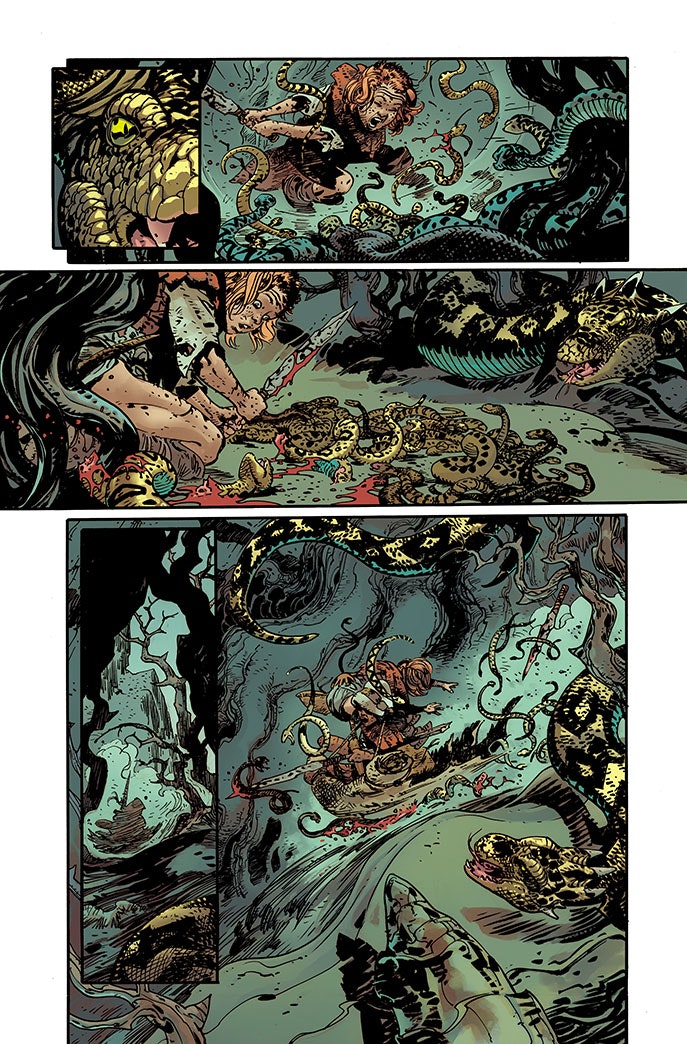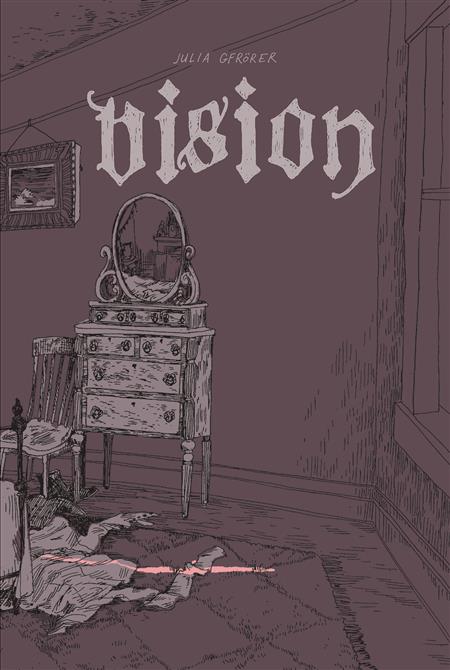In a recent issue of Jason Aaron and R. M. Guéra’s series of twice-told biblical tales, The Goddamned: The Virgin Brides #3, Aaron doesn’t give a “fuck,” he gives eighteen, exactly, along with four “cunts,” three “shits,” three “bitches” and one “bastard” for good measure. Counting cuss words in a comic book is (probably) a stupid way to spend one’s time, approaching rewarding only as an opportunity to call bullshit. Aaron avoids serious themes such as redemption or morality in both the story and character and instead indulges in profanity, blood and bluster to conceal mediocrity and meaningless violence. If Aaron doesn’t give a fuck, why should the reader? And when you can get Guéra and Giulia Brusco to play along and ugly it up with their brand of grubby, unsentimental and warty art … do that, do that every time, do it twice on fucking Sunday.
This isn’t about going all Wertham on Aaron, there are no innocents to defend, let alone children. Face it, no one under the age of 30, 40 (?) reads The Goddamned. Hell, no. In service to its gratuitousness, inanity and pointlessness Aaron et al. have made a comic that embodies the memeable, something like “if 2020 was a comic book, it would be the Goddamned: The Virgin Brides.”
Since its debut in 2015, The Goddamned has been about four-letter-words and 4-color violence on a biblical scale. This is that old-timey religion, the old-school God of the Old Testament, the God who orders a father to kill his son as a trust exercise, a trolling God. Aaron leans into this idea, hard. What started with an unkillable killing machine in Cain and a belligerently boffo Noah in volume one has become a road movie in this second iteration. Goddamned: The Virgin Brides stars a potty-mouthed troublemaker, Jael, and her bestie, a wide-eyed innocent, Sharri. Both have been cut out for a convent of over-the-top nuns to be child brides to angels. This unholy union results in the Nephilim, which depending on your belief system could be as benign as a giant (think Hagrid) or a satanic brood of monster babies. Guess which one readers are signed up for?
Jael discovers the Nephilim and learns what happens once the nuns find out their charge’s “roses” have “bloomed.” Because she’s written as a simple scallywag who’s going to buck the system regardless, Jael grabs Sharri and lights out. The girls are pursued by the “warriors,” bare-chested female fighters who serve the cause by hunting up children from neighboring tribes to keep the convent stocked—tits-out pimps with swords and spears as righteous and as crooked as Harry Powell. The warriors have one note, their look, and while this affords them a certain agency, it hides any need to develop these characters further other than a pointy end to spur the plot along.
 Suffice to say, there exists no “good” in The Goddamned. Sharri and Jael kill as a means to survive, but they also kill with cruelty, without faith or belief in anything. Pyschopathic children who brutally murder adults because ... cool? After a merciless mercy kill, a teary-eyed Jael tells Sharri, “save your water […] they’re [the warriors] not worth your tears.” Bleakness can be fun and pessimism profitable, wildly so (ask Aaron’s fellow southern gentleman, Robert Kirkman). But to what end? Like his protagonists, Aaron’s plot centers on what the girls are escaping from and not what they’re escaping to. That would require faith, belief, intelligence beyond raw survival. Whatever that further shore, Aaron offers no salvation, only another metaphorical mountain to climb devoid of all meaning. When ‘fuck it’ becomes the prevailing wisdom it doesn’t matter if it’s the antediluvian age or today. If Aaron’s goal is to show how deep the rabbit hole of depravity goes, mission accomplished. So what?
Suffice to say, there exists no “good” in The Goddamned. Sharri and Jael kill as a means to survive, but they also kill with cruelty, without faith or belief in anything. Pyschopathic children who brutally murder adults because ... cool? After a merciless mercy kill, a teary-eyed Jael tells Sharri, “save your water […] they’re [the warriors] not worth your tears.” Bleakness can be fun and pessimism profitable, wildly so (ask Aaron’s fellow southern gentleman, Robert Kirkman). But to what end? Like his protagonists, Aaron’s plot centers on what the girls are escaping from and not what they’re escaping to. That would require faith, belief, intelligence beyond raw survival. Whatever that further shore, Aaron offers no salvation, only another metaphorical mountain to climb devoid of all meaning. When ‘fuck it’ becomes the prevailing wisdom it doesn’t matter if it’s the antediluvian age or today. If Aaron’s goal is to show how deep the rabbit hole of depravity goes, mission accomplished. So what?
The issue ends with the girls being boxed in by the mountains they thought they had put behind them. The realization causes Jael to say with all the wonder and gravity of a wet fart, “God’s the cruelest cunt of all.” Rather than hopeless, Jael’s words sound smug and snotty. She’s name-calling. Her insult lacks anger, passion, awe, frustration or hate. They're empty words hurled at a derelict God. Aaron’s point is pointless, it's nihilism without the carefree nonchalance of cool, mindless taunting and zero conviction. Jael doesn't have an opinion on God because she doesn't believe in God. Why would she?
What The Goddamned: The Virgin Brides lacks is grace, God’s grace (favor) to be specific. These characters are dammed by God, which is a heady concept to pull off without hope. Jael tells Sharri, “wherever we go … we go together” and later confesses to Sharri—as she lies unconscious from multiple snakebites—she loves her. Jael’s admission is self-motivated and not entirely heartfelt, “I worry about who I’ll become … if your eyes stay closed,” she says. It’s not enough to forgive Aaron his trespasses, hope by consignment is still hope and perhaps it’s enough, the Hulk that holds up the mountain the wickedness and crassness that is The Goddamned.
It would be a sin (sorry) not to mention the giant talking snake at the center of the story. For whatever reason, the snake talks like a sassy teenager in need of constant validation. The phrase “am I right?” shows up as does, “where is that crazy bitch” when the snake asks after Jael. Letterer Jared K. Fletcher gives the snake’s dialogue a spikiness, the “Fs” of his “fucks” are a little longer and sharper. Subtlety is everything in lettering and Fletcher comes up aces here even if the dialogue wallows adolescence.  Like most cartoonists, Guéra gets to draw a fair share of characters walking, talking and bloodletting, but scarcely few scenes featuring a fork-tongued serpent with horns like a triceratops and vestigial flippers. Guéra plays with perspective to make the snake appear thicker or more sinuous as needed, masterful monster mark-making. Brusco gives the serpent golden-green eyes that comically pop open or close into teardrops when he throws some side eye. There’s an underwater fight scene pitting Jael and the snake against lions that doesn’t last as long as a scene involving lions fighting UNDERWATER against a giant serpent and a twelve-year-old girl should. Guéra doesn’t cover himself in glory either. He insets one tiny panel of Jael drawing blood from one of the lions and resigns the rest of the fight to a single panel showing an overhead view on the water’s roiling surface due to the battle below, a rare detour into discretion for a comic that delights in depravity.
Like most cartoonists, Guéra gets to draw a fair share of characters walking, talking and bloodletting, but scarcely few scenes featuring a fork-tongued serpent with horns like a triceratops and vestigial flippers. Guéra plays with perspective to make the snake appear thicker or more sinuous as needed, masterful monster mark-making. Brusco gives the serpent golden-green eyes that comically pop open or close into teardrops when he throws some side eye. There’s an underwater fight scene pitting Jael and the snake against lions that doesn’t last as long as a scene involving lions fighting UNDERWATER against a giant serpent and a twelve-year-old girl should. Guéra doesn’t cover himself in glory either. He insets one tiny panel of Jael drawing blood from one of the lions and resigns the rest of the fight to a single panel showing an overhead view on the water’s roiling surface due to the battle below, a rare detour into discretion for a comic that delights in depravity.
Snakes in biblical fiction, or otherwise, don’t consort with humans unless they’re cutting deals and this one is no different. He’s looking to recruit Jael—her reputation proceeds her apparently, but why her, specifically, goes unsaid—for what he calls “our side.” He warns of a coming flood and agrees to save Sharri and does. Jael buries a sword through his skull immediately afterward so, oh, well. Articulate animal guides are staples in myths, throw in the biblical associations with serpents and a myriad of storytelling choices open up, or, instead, just say ‘fuck it,’ slam a blade through its brain and move on. After all, this snake is nothing more than a plot device and as Jael says, “God’s a cunt,” to which the snake would add “am I right?” if he wasn’t wasted already.
Critiquing a story that’s incomplete ranks alongside tallying curse words in a comic book for (supposed) ‘mature readers.’ Why the owners of this work, Guéra and Aaron, couldn’t eschew the floppy and put their story out as a complete work in the first place instead of in installments is beyond reason, but that’s an economic discussion for another day.
You know what? Fuck it, it’s not. It’s the same sort of denial that’s bent on self-destruction and recklessness regardless if it’s the hellscape of The Goddamned or the current comic book marketplace. Perhaps Jael will find salvation, learn, adapt and grow. Maybe the reader will find out when the final issue drops in early December (assuming it comes out on time) that Aaron and Guéra were playing the audience all along and the series ends as an echo of the Lord’s prayer, “on earth as it is in Heaven.” Excelsior, indeed. Which means all this handwringing about authorial indifference, cursing and a lack of grace will be futile—a careless comic from a maddening marketplace in a washed-up world waiting for the flood. So 2020.







